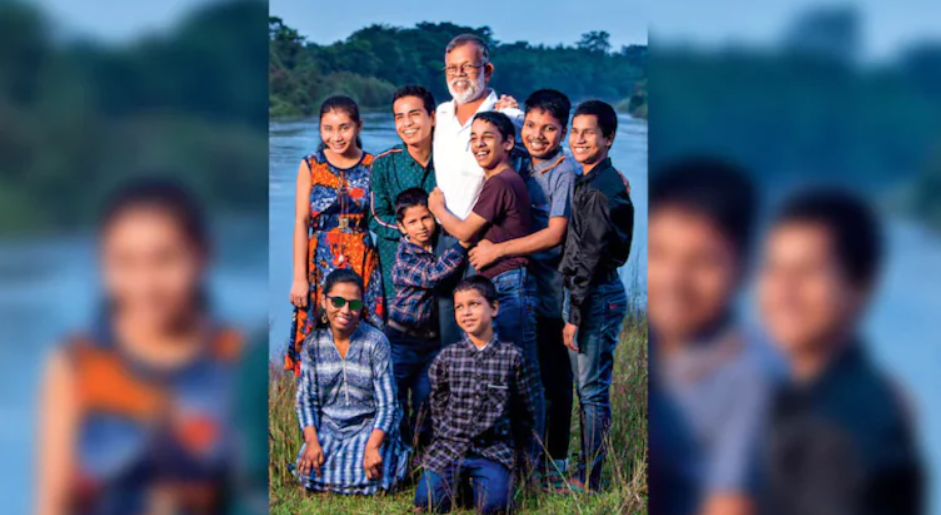EXEMPLAR: The Smile Multipliers are inspiring individuals and institutions from all over the country who have found special ways to open hearts and spread cheer. Dedicated to Kumud Kalita and his decade long labour of love.
On a September afternoon, sitting on her wheelchair, 15-year-old Kamakshi waits patiently. She is looking forward to feeding lunch, a frugal meal of lentil and rice, to her adoptive father Kumud Kalita with her own hand. What makes this little domestic display of love sweeter is that Kamakshi, a cerebral palsy patient, can barely move her hands, and yet attempts to make small morsels of food with her left hand to feed Kalita. Mostly, though, she just keeps him company while he eats. Kamakshi was three when Kalita had rescued her from a temple compound where she had been abandoned by her biological parents. This daily lunch-time ritual is the happiest time of Kamakshi’s day.
She is not the only one who looks up to Kalita. For the past 16 years, Kalita, a lecturer in a junior college in Assam’s Pathsala town, has been the source of happiness for 30 differently-abled and orphaned children aged between 6 and 17. Having found them in various locations across Assam, Kalita has not only given these children a home but has also taken care of their education, running a special school for them. He has built a shelter home, Tapoban, for them on a two-bigha plot he bought at a throwaway price in 1988.
At this school, the children are taught music and other skills apart from academics. In fact, it was a performance by two of Tapoban’s visually-impaired girls on a local TV show that first brought Kalita’s silent efforts into the limelight. “I never asked for any publicity or recognition because I was doing something I wanted to….It’s my passion. This is what gives me unadulterated happiness,” says Kalita.
Son of a marginal farmer, Kalita, a brilliant student, grew up in abject poverty. When he was working as a server at a tea stall to fund his university education, he came in touch with the NGO SOS Children’s Village, which helped him find his purpose in life—to support children abandoned by society. “I was poor, but I had parents. The orphaned children have it worse; they don’t even have emotional support. Plus, there are many who are keen to adopt healthy children, but nobody comes forward to embrace specially-abled kids. So, I decided to work for them” says Kalita.
For most of this over a decade-long journey, which has not been without its obstacles, Kalita has funded these children’s welfare using his own earnings and savings. In 2005, when he brought home three children for the first time, he faced ridicule. He was branded a lunatic for going from village to village, collecting orphaned and specially-abled children. Even his wife Luki Patgiri, now 50, threatened to leave him. “She used to get upset as these children needed help all the time, but now she is a mother to all of them,” says Kalita.
Over the years, though, as more people came to know of Kalita’s work, several individuals and organisations stepped up to help, including doctors. As external funds began to flow in, Kalita formed a trust, Students’ Welfare Mission, and donated even his land and home to this trust.
The biggest challenge, though, has been setting up a school for these children who need a special curriculum and trained teachers. In Pathsala, a small town, he had to move from pillar to post to find braille kits. He did not even have enough money to pay trained teachers a respectable salary. “Those teaching here are not doing a job, they are living their passion,” Kalita says. But his efforts have paid off. This year, three Tapoban children became the first in the home to pass their class 10 board exams. Two of them have taken admission at a blind school in Guwahati for further education while the third accompanies Kalita to his college. He is now worried about managing children with other disabilities once they pass their class 10 exams since there are hardly any special schools for them. “My ambition now is to add two more classes to Tapoban. I’m hopeful all the stakeholders in society, including the state government, will come forward to ensure a brighter future for these children,” says Kalita.
Article Credit: indiatoday

Pingback: Chandigarh Education Dept Drafts Country’s First Education Policy For Specially Abled Children - SLSV - A global media & CSR consultancy network